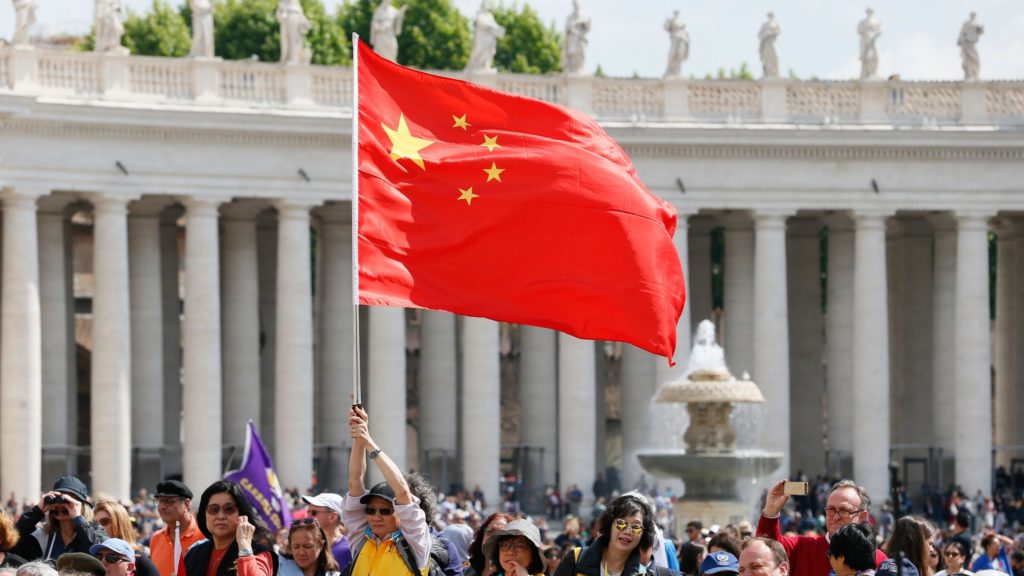Earlier this week, China’s government officially recognized Bishop Melchior Shi Honghzen as the head of the Diocese of Tianjin, several years after Pope Francis named him to lead the ecclesiastical jurisdiction.
Days later, the Vatican hailed the move as “a positive fruit of the dialogue” between the Holy See and the Chinese government.
But behind the exchange of warm diplomatic signals lies a high-stakes struggle between Rome and Beijing.
Relations between the two states have been strained since the “Provisional Agreement” between the Holy See and the People’s Republic of China regarding the appointment of bishops was signed in Beijing on Sept. 22, 2018.
The terms of the Provisional Agreement are recorded in a secret document, so there is not a full understanding of its details, but it aims to heal the division between the Vatican-appointed “underground” Church leadership and the Communist-controlled Catholic Patriotic Association.
As anyone may easily imagine, working within the terms of the Agreement has made for some rough going on both sides.
Beijing has repeatedly violated the terms of the deal, appointing bishops without the pope’s consent and leaving Rome essentially to rubber stamp the unilateral Chinese actions.
In the meantime, China’s top leader, Xi Jinping, has enacted policies attacking religious freedom in the country. Xi insists on the “Sinicization” of Christianity, a term referring to the assimilation of non-Chinese ideas and social groups into Chinese culture.
Aid to the Church in Need (ACN) said there were 20 cases of clergy under arrest at some point in 2023 in China, adding that some of them remain unaccounted for after many years. The charity said the true number could be higher — or even slightly lower — as some priests or bishops may have been released without details being made public.
For the most part, the Vatican has been silent on these attacks and renewed the deal every two years and hopes to renew it again soon.
So how significant is the Chinese government’s recognition of Shi?
Well, the bishop is 95 years old, and his diocese is relatively small, with only around 56,000 Catholics.
Chinese media said he was required to swear “to uphold the national constitution, to protect the unity and social harmony of China, to love both country and church and to always uphold the direction of Sinicization of Catholicism in China.”
It also happened at a precarious time for Christians in China.
According to the 2024 report by the United States Commission on International Religious Freedom (USCIRF), religious freedom conditions deteriorated in China last year due to the “Sinicization of religion” policy.
The USCIRF said Sinicization requires groups to follow the CCP’s Marxist interpretation of religion, including by altering religious Scriptures and doctrines to conform to that interpretation. It noted that China placed more restrictions on religious freedom in September 2023 with new measures for the Management of Religious Activity Venues.
“Despite the Vatican-China agreement on bishop appointments,” the report said, “in April the government installed a bishop without Vatican approval. Authorities continued to forcibly disappear and convict underground Catholic priests — including Bishop Augustine Cui Tai and Bishop Joseph Yang Xiaoming — who refused to join the state-controlled Chinese Catholic Patriotic Association.”
The report also noted how persecution of Protestant “house church” Christians has intensified in China.
“The government continued its nationwide crackdown on house churches, detaining, arresting, and sentencing independent Protestants on security and criminal charges,” the report said. It also noted, “Authorities tortured Christians held in secret detention centers and prisons,” and, “in Henan Province required Protestants to register on a government ‘smart-religion’ app to attend worship services.”
The report also noted Chinese authorities’ continued persecution of “ethnic minority Protestants, such as Miao, Lisu, and Nu Christians.”
So why is the Vatican acting so positively about its relationship with China?
First of all, it is adhering to the words (falsely) attributed to Winston Churchill, “Jaw, jaw is better than war, war.”
Xi’s leadership in China has brought significant change to the country’s rule. He has held his position since 2012, ending term limits that were supposed to prevent the idolization of Chinese leaders.
Instead, Xi’s leadership has generated a cult of personality, with books, cartoons, pop songs, and dance routines praising him and his rule, which has highlighted the nation’s unique culture and given renewed emphasis to the role of communism in China.
This presents a unique challenge for the Catholic Church — one that the Vatican certainly recognizes.
To make things more complicated, the Holy See is one of only a dozen countries that has diplomatic relations with the government of Taiwan, a fact that is irksome to the Beijing regime, which is actively seeking the reintegration of the island.
In addition, the Vatican still appoints the bishops in Hong Kong and Macau — former European colonies brought back to Chinese rule in the 1990s.
Add to this the fact the Vatican appoints bishops around the world (actually, a relatively new fact, since governments usually were involved in this until the last 150 years), and Xi sees Christianity, and especially Catholicism, as a “foreign religion.”
However, Francis and the Vatican have been praising Chinese culture and emphasizing its broad compatibility with Christian morality. They also know cults of personality tend to end when the person disappears from the scene, and Xi just turned 71.
Last year, Hong Kong’s Jesuit bishop, Cardinal Stephen Chow, told Jesuit-run magazine La Civiltà Cattolica a lack of communication is largely to blame for the troubles with the Vatican-China deal. “Discrepancies in understanding between the two sides on the assignment of bishops to other dioceses could be a factor requiring better understanding,” Chow said.
In other words, the Vatican is trying to keep the door open in its dialogue with China — even if Beijing seems to be closing it.

